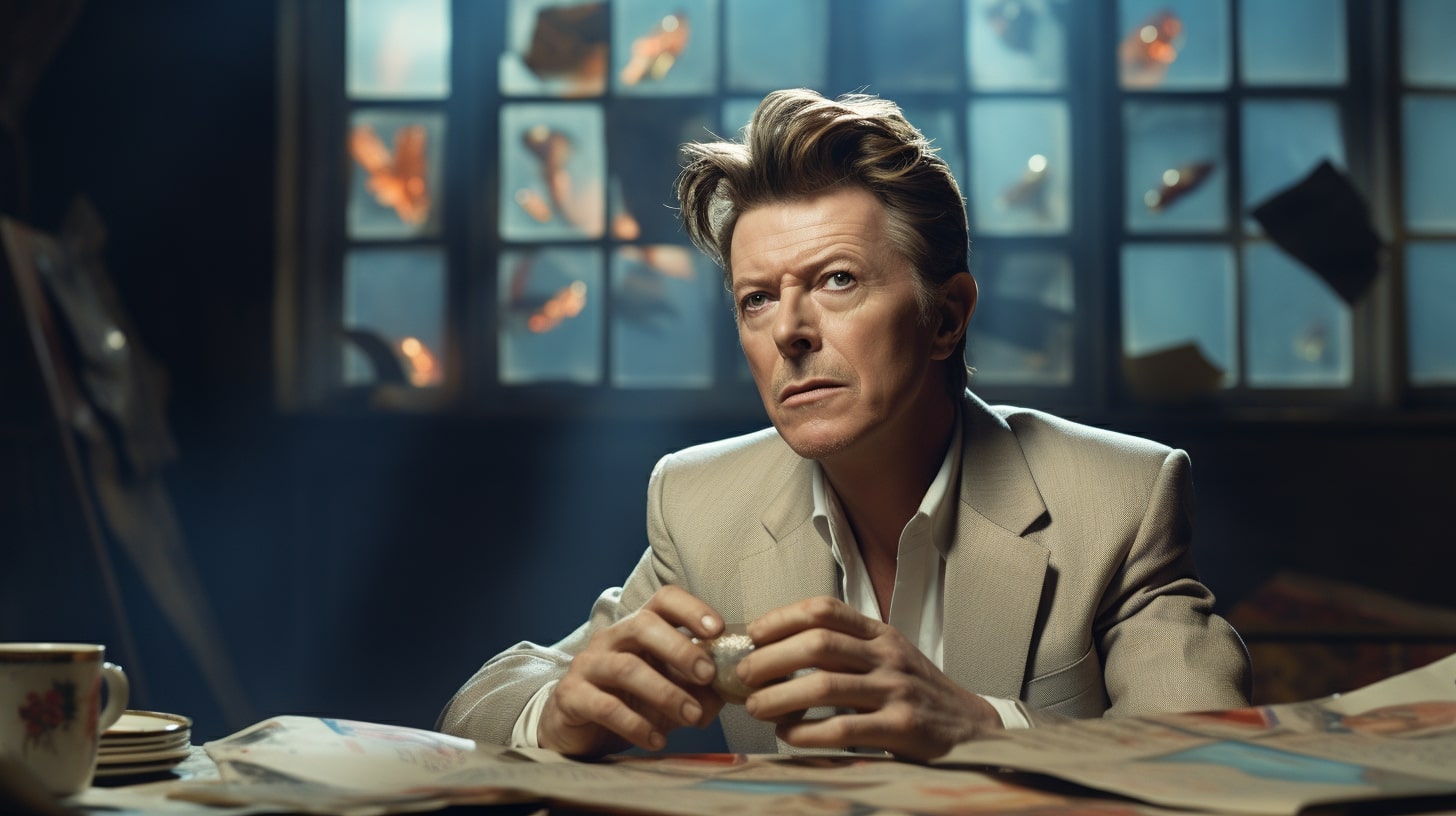Let’s dive right into the world of David Bowie—a name that’s as legendary as the man himself. But have you ever stopped to wonder why David Bowie isn’t actually named Bowie? Yup, that’s right—there’s a fascinating backstory behind this iconic name change. So, grab your seat, because we’re about to unravel the mystery of why David Bowie decided to reinvent himself, and how that choice shaped one of music’s greatest legacies.
David Bowie is more than just a musician—he’s an enigma wrapped in art, wrapped in mystery. His transformation from David Jones to David Bowie wasn’t just a name change; it was a declaration of artistic freedom and a bold step toward defining his identity. This decision wasn’t random, though. There’s a reason behind every move Bowie made, and today, we’re going deep into that reason.
But hold up—before we get into the nitty-gritty, let’s set the stage. David Bowie’s life wasn’t just about music; it was about reinvention, creativity, and pushing boundaries. His name change was the first step in a journey that would redefine pop culture forever. So, if you’ve ever wondered why Bowie swapped his birth name for something entirely new, you’re in the right place.
Read also:Grove The Diplomat The Ultimate Guide To A Masterful Career In Diplomacy
Biography of David Bowie: A Quick Dive
Early Life and Background
David Robert Jones was born on January 8, 1947, in Brixton, London. Growing up in a modest household, young David was always drawn to the arts. He picked up the saxophone at the age of 13 and quickly became obsessed with music. But music wasn’t the only thing on his mind—David was also fascinated by acting, mime, and visual art. These early influences would later shape his unique style and approach to performance.
The Name Change: A Turning Point
So, why did David Bowie change his name? Well, it all started in the mid-1960s. At the time, David Jones was already making waves in the music scene, but there was a problem—another artist named Davy Jones was already out there. Yup, the Davy Jones from The Monkees. Confusion was inevitable, and Bowie wasn’t about to let his career get overshadowed by a TV star. So, he did what any true artist would do—he reinvented himself.
Why Did David Bowie Change His Name? The Real Reason
Now, here’s where things get interesting. Bowie’s decision to change his name wasn’t just about avoiding confusion. It was about creating a persona that reflected his vision of himself as an artist. He wanted a name that was memorable, mysterious, and completely his own. And let’s be honest—who could forget the name Bowie?
Bowie’s inspiration for the name came from a few different places. First, there was Jim Bowie, the famous 19th-century knife-fighting legend. Bowie admired the rugged individualism and rebellious spirit associated with the name. Second, there was the bowie knife itself—a symbol of strength and resilience. By adopting the name Bowie, David Jones was sending a message: he wasn’t just another musician—he was a force to be reckoned with.
The Impact of the Name Change on Bowie’s Career
Changing his name was a pivotal moment in Bowie’s career. It allowed him to establish a distinct identity and set himself apart from the crowded music scene of the 1960s. Suddenly, he wasn’t just David Jones anymore—he was David Bowie, a name that evoked intrigue and curiosity. This newfound identity gave him the freedom to explore different musical styles and personas, which would become a hallmark of his career.
But the impact didn’t stop there. Bowie’s name change also signaled a shift in his approach to art. He began to embrace experimentation and innovation, pushing the boundaries of what music could be. This willingness to reinvent himself would later lead to some of his most iconic works, including Ziggy Stardust and The Thin White Duke.
Read also:Penn Amp Teller Hostess The Backbone Of An Illusionary World
David Bowie’s Biodata: A Closer Look
Basic Information
| Full Name | David Robert Jones |
|---|---|
| Stage Name | David Bowie |
| Date of Birth | January 8, 1947 |
| Place of Birth | Brixton, London, England |
| Occupation | Singer, Songwriter, Actor, Producer |
| Years Active | 1962–2016 |
Key Influences Behind the Name Change
Bowie’s decision to change his name wasn’t made in a vacuum. Several factors influenced his choice, including his admiration for American culture, his love of mythology, and his desire to create a persona that transcended the ordinary. Let’s break it down:
- Admiration for American Icons: Bowie was deeply inspired by American musicians and cultural figures. By adopting a name that sounded distinctly American, he was aligning himself with the musical legends he admired.
- Mythological References: Bowie was fascinated by mythology and symbolism. The name Bowie carried connotations of strength and resilience, qualities he wanted to embody as an artist.
- Reinvention as Art: For Bowie, changing his name was an act of artistic expression. It allowed him to create a persona that was separate from his everyday self, giving him the freedom to explore new identities and ideas.
How the Name Change Shaped Bowie’s Legacy
Bowie’s name change wasn’t just a clever marketing move—it was a fundamental part of his artistic identity. By embracing the name Bowie, he created a persona that was larger than life, one that would inspire generations of musicians and artists. His willingness to reinvent himself became a defining characteristic of his career, and it all started with that one bold decision to change his name.
Today, Bowie’s legacy lives on through his music, his art, and his enduring influence on popular culture. His name change was just the beginning of a journey that would take him from humble beginnings in Brixton to the heights of international stardom. And it all started with a simple question: why not?
David Bowie’s Musical Journey
Early Struggles and Breakthroughs
Before he became a household name, Bowie faced his fair share of struggles. In the early days, he struggled to find his voice and establish himself in the competitive music scene. But his name change marked a turning point. Suddenly, everything clicked. He released his self-titled debut album in 1967, and the rest, as they say, is history.
The Rise of Ziggy Stardust
One of Bowie’s most iconic creations was Ziggy Stardust, a character that embodied his love of science fiction, mythology, and rock ‘n’ roll. Ziggy became a symbol of rebellion and individuality, and Bowie’s performance as Ziggy cemented his status as a trailblazer in the music world.
Lessons from Bowie’s Name Change
Bowie’s decision to change his name offers valuable lessons for anyone looking to establish themselves in a competitive field. Here are a few takeaways:
- Be Bold: Bowie wasn’t afraid to take risks, and neither should you. Sometimes, the boldest moves are the ones that pay off the most.
- Embrace Your Identity: Bowie’s name change was about more than just avoiding confusion—it was about defining who he was as an artist. Take the time to discover your own identity and let it guide your creative journey.
- Reinvent Yourself: Bowie’s career was built on a foundation of reinvention. Don’t be afraid to evolve and grow as an artist. The world is always changing, and so should you.
David Bowie’s Influence on Pop Culture
Bowie’s impact on pop culture cannot be overstated. From his groundbreaking music to his avant-garde fashion, he left an indelible mark on the world. His name change was just the beginning of a journey that would inspire countless artists and fans around the globe. Today, Bowie is remembered not just as a musician, but as a cultural icon whose legacy continues to resonate.
Conclusion: Why Did David Bowie Change His Name?
So, why did David Bowie change his name? The answer is simple yet profound: he wanted to create a persona that reflected his vision of himself as an artist. By adopting the name Bowie, he set himself apart from the crowd and paved the way for a career that would redefine the boundaries of music and art. His name change was more than just a practical decision—it was a statement of intent, a declaration of artistic freedom, and a testament to his willingness to reinvent himself.
As we reflect on Bowie’s legacy, let’s remember the lessons he taught us. Be bold, embrace your identity, and never be afraid to reinvent yourself. After all, as Bowie himself once said, “Ch-ch-changes! Turn and face the strange.” So, go ahead—make your mark on the world, just like Bowie did.
And now, it’s your turn. What do you think about Bowie’s name change? Let us know in the comments below, and don’t forget to share this article with your friends. Together, let’s keep the spirit of Bowie alive and inspire the next generation of artists and dreamers.
Table of Contents
- Biography of David Bowie
- Why Did David Bowie Change His Name?
- The Impact of the Name Change on Bowie’s Career
- David Bowie’s Biodata
- Key Influences Behind the Name Change
- How the Name Change Shaped Bowie’s Legacy
- David Bowie’s Musical Journey
- Lessons from Bowie’s Name Change
- David Bowie’s Influence on Pop Culture
- Conclusion


